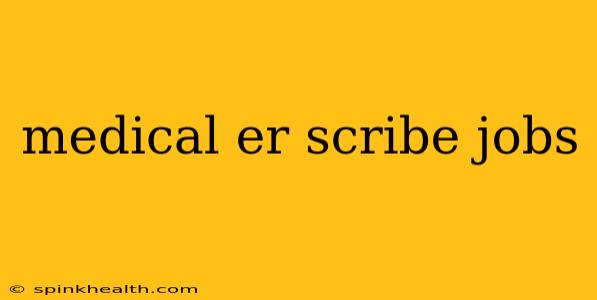Charting a Course: Navigating the World of Medical ER Scribe Jobs
The flashing lights, the urgent calls, the whirlwind of activity – the Emergency Room (ER) is a high-stakes environment demanding precision and speed. Amidst this controlled chaos, medical scribes play a crucial role, assisting physicians with documentation and freeing them to focus on patient care. But what exactly does a medical ER scribe do, and what’s it like to navigate this fast-paced career? Let's delve into the world of medical ER scribe jobs.
Imagine this: You're seated beside a seasoned ER physician, listening intently as they examine a patient suffering from a severe allergic reaction. Every detail – from the patient's vital signs to the medications administered – needs to be meticulously recorded. That's where you, the ER scribe, step in. You're not a doctor, but you're an invaluable part of the team, translating the physician's actions and observations into clear, concise medical documentation.
What Does a Medical ER Scribe Do?
Your day-to-day responsibilities as a medical ER scribe will vary depending on the hospital and the physician you're assisting, but generally, you'll be responsible for:
- Charting patient information: This includes recording medical history, physical exam findings, diagnostic test results, treatment plans, and progress notes. Accuracy and speed are paramount here!
- Documenting physician orders: You'll carefully record every instruction given by the physician, ensuring all details are correct and readily accessible.
- Assisting with administrative tasks: This could involve scheduling appointments, handling insurance information, or managing patient files. The specifics will depend on the facility.
- Maintaining patient confidentiality: HIPAA compliance is a critical aspect of the job; protecting patient privacy is of utmost importance.
What are the Benefits of Becoming a Medical ER Scribe?
This isn't just about typing; it's a springboard to a rewarding healthcare career. The benefits are numerous:
- Gain valuable medical experience: You'll witness firsthand the fast-paced nature of ER medicine, learning medical terminology, procedures, and diagnostic processes.
- Develop crucial skills: This job hones your attention to detail, time management skills, and ability to work under pressure—skills transferable to various professions.
- Potential for career advancement: Many scribes use this role as a stepping stone to medical school, nursing school, or other healthcare careers. The experience provides an invaluable foundation.
- Competitive salary: ER scribe positions offer competitive compensation, especially considering the entry-level nature of the role.
How Much Do Medical ER Scribes Make?
The salary for a medical ER scribe varies based on location, experience, and the employer. However, you can generally expect a competitive wage, often above minimum wage, and potentially with benefits depending on the employer. Researching specific locations and employers will provide a more precise salary range.
What Skills and Qualifications Do I Need to Become an ER Scribe?
While formal medical education isn't required, certain skills and qualifications are highly desirable:
- Exceptional typing skills: Speed and accuracy are essential for keeping up with the pace of the ER.
- Medical terminology knowledge: A basic understanding of medical terms will significantly aid your performance.
- Excellent attention to detail: Accuracy in documentation is paramount to patient safety and legal compliance.
- Ability to work under pressure: The ER is a high-stress environment, requiring composure and efficiency.
- Strong communication skills: You’ll need to communicate effectively with physicians and other healthcare professionals.
What is the job outlook for Medical ER Scribes?
The demand for medical scribes is growing, reflecting the increasing administrative burdens on healthcare professionals. As healthcare systems seek efficient methods to enhance documentation and patient care, the role of the medical scribe will likely remain critical and in-demand.
How can I become a Medical ER Scribe?
Typically, becoming a medical ER scribe doesn't require a degree. Many employers prioritize strong typing skills, attention to detail, and a basic understanding of medical terminology. Some employers may offer on-the-job training. Look for entry-level scribe positions at hospitals or clinics.
The fast-paced, demanding, yet ultimately rewarding world of medical ER scribe jobs presents a unique opportunity to gain invaluable experience in the healthcare field. By understanding the responsibilities, benefits, and qualifications involved, you can confidently chart your course towards a potentially fulfilling career.

